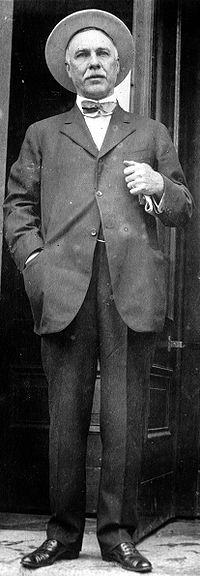Thomas Taggart
| Thomas Taggart | |
|---|---|
 |
|
|
United States Senator from Indiana |
|
|
In office March 20, 1916 – November 7, 1916 |
|
| Preceded by | Benjamin F. Shiveley |
| Succeeded by | James Eli Watson |
| 18th Mayor of Indianapolis | |
|
In office January 1, 1895 – December 31, 1901 |
|
| Preceded by | Caleb S. Denny |
| Succeeded by | Charles A. Bookwalter |
| Personal details | |
| Born | November 17, 1856 County Monaghan, Ireland |
| Died | March 6, 1929 (aged 72) Indianapolis, Indiana |
| Political party | Democratic |
| Spouse(s) | Eva Bryant Taggart |
| Relations | Owen Taggart |
Thomas Taggart (November 17, 1856 – March 6, 1929) was a U.S. political figure, serving as mayor of Indianapolis and influential in state and national politics.
Born in County Monaghan, Ireland, Taggart immigrated with his parents to the United States in 1861. The family settled in Xenia, Ohio, where young Taggart got a job working the lunch counter at the railroad depot. At age 18, he was sent by his employer to manage the depot restaurant and hotel in Garrett, Indiana, where he met his future wife Eva Bryant. They married in 1878.
Taggart moved to Indianapolis in 1877 to run the restaurant at Union Depot.
Taggart became active in local politics in Indianapolis. He served as auditor of Marion County from 1886 to 1894. In 1895 he was elected mayor of Indianapolis, and served until 1901. He founded the city's park system during his tenure.
He was chairman of the Democratic National Committee from 1904 until 1908. Taggart played a key role in ensuring the nomination of Thomas Riley Marshall as the Democratic nominee for Indiana Governor in 1908, and again in securing the Vice Presidential nomination for Marshall in 1912 at the Democratic National Convention in Baltimore.
On March 20, 1916, Taggart was appointed by Governor Samuel M. Ralston to the United States Senate seat left vacant by the death of Senator Benjamin F. Shively, but he was defeated for the seat in the November election.
In the 1924 gubernatorial campaign Taggart urged front-runner Carleton B. McCulloch to take an anti-Ku Klux Klan position. McCulloch's anti Klan position contributed to his losing the election to Klan member Edward L. Jackson who enjoyed strong Klan support.
...
Wikipedia
